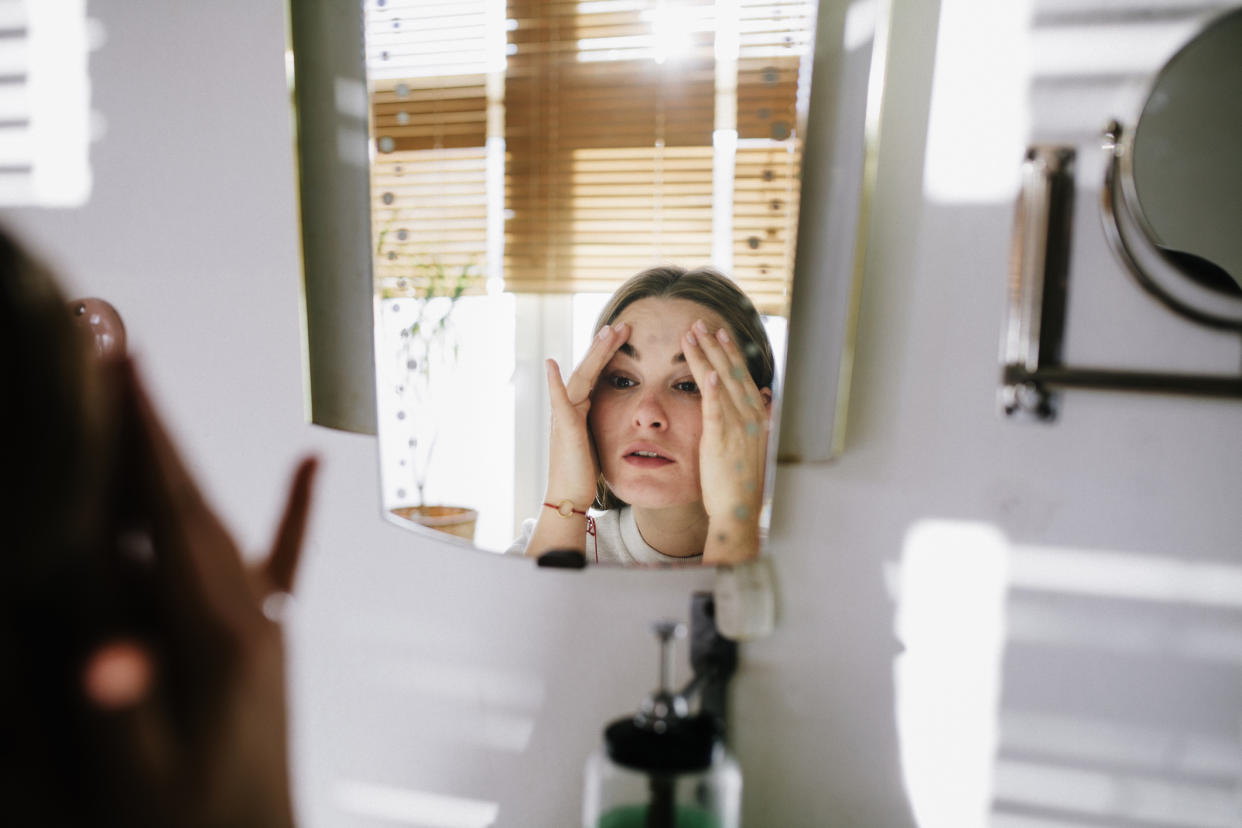Yet another beauty term has become trendy in the wellbeing world of TikTok, and while a pinch of Epsom salts might do the trick for some, the latest trend is causing stress for Brits who worry that rising cortisol levels will make their faces swell.
So-called “Moon Face”,Also, “Cortisol face”This refers to the side effects on the skin that occur when the stress hormone cortisol builds up in the body.
Before you start Googling stress-relief solutions in fear of a puffy face, experts are warning worried people not to panic just yet.
“While chronically high cortisol levels can cause facial swelling, this is typically seen with more severe endocrine disorders rather than the everyday stress that most people experience,” says Dr Vijay Murthy, functional medicine physician and co-founder of Harley Street Clinic. Murthy Health.
What is a “Moon Face”?
Dr Murthy says the term cortisol face, or “moon face”, often describes a round, puffy face caused by high cortisol levels, especially in conditions like Cushing’s syndrome.
“But the idea of cortisol face, which has been popularized on social media as a common phenomenon for all stressed people, is largely a myth,” he added.
This phenomenon gets its name from the excess fat that accumulates in the face, making the face look puffy or “moon-faced.”
High hormone levels can cause facial swelling and inflammation, but general stress is extremely rare, Dr Murthy says.
“You’re unlikely to experience a cortisol face from mild or moderate stress,” he explains. “Cortisol face is a common symptom of severe endocrine disorders, such as Cushing’s syndrome, in which cortisol levels are significantly and prolongedly elevated.”
“Everyday stress, even chronic stress, does not usually raise cortisol to the levels needed to cause such noticeable physical changes.”


The relationship between stress and facial swelling
You may not have to worry too much about your face puffiness when you’re stressed, but that doesn’t mean those emotions don’t affect your skin.
“Most inflammatory skin and autoimmune diseases are triggered by stress (either mental or physical),” explains consultant dermatologist Dr Karishma Hemadi. Stratum Clinic.
“Stress may be a major factor influencing skin conditions such as acne, but the exact mechanisms and extent of its impact may vary from person to person.”
The relationship between stress and skin is complex, but Dr Hemadi says there are several ways that periods of anxiety can have a cascading effect on your face.
-
Cortisol production: Stress stimulates the release of cortisol, a hormone that increases sebum production and inflammation, both of which contribute to acne.
-
Behavioral factors: Stress can lead to behaviors like poor diet, lack of sleep, and neglecting skin care, all of which can worsen acne and other skin conditions.
-
Immune system: Chronic stress weakens the immune system, making the skin more susceptible to infections and slowing the healing of acne and other skin conditions.
“Many people underestimate the impact stress has on their skin,” explains skin and beauty expert Nina Prisk. Aesthetic Updates.
“It causes chemical changes in the body, directly affects the skin, the study We know that stress and skin conditions are closely related.”
Prisk says stress can cause some surprising symptoms, including:
Dry, flaky skin
“When you’re in a stressful situation, your adrenaline rush can make you sweat more, which can lead to dehydration of the skin,” Prisk explains, “which typically shows up as dry, flaky skin.”
rash
When you feel stressed, your body releases adrenaline and cortisol, which can affect blood flow to the skin and cause skin irritation and rashes.
Rosacea-like dermatitis
Stress can trigger inflammatory conditions like rosacea, which can cause redness and, in some people, visible veins on the nose, cheeks, forehead, chin, and neck. “Some people may also experience a stinging or burning sensation when using water or skin care products,” adds Prisk.
Acne
Although stress is rarely the cause of acne, the study It has been shown that it may worsen skin conditions such as acne and cause inflammation.
“This is thought to be because the stress hormone cortisol enters the bloodstream and increases production of sebum, a natural oil,” Prisk explains. “Increased sebum production clogs pores and worsens acne. Combined with the fact that stress slows down the healing of the skin and stressed people are more likely to pick or scratch their skin, acne may be more visible for longer periods during stressful times.”


How to Treat Skin Problems Worsened by Stress
Dr Hemadi says that to effectively manage skin conditions, it’s important to consider an integrative approach, including:
-
Eat a balanced diet: “Focus on low glycemic index foods, reduce dairy and unhealthy fats, and increase your intake of omega-3 fatty acids and antioxidants,” she adds.
-
Get enough sleep: Dr. Hemadi recommends getting seven to nine hours of quality sleep a night to maintain healthy skin and hormonal balance.
-
Manage Stress: Practice stress reduction techniques such as exercise, meditation, deep breathing, and mindfulness to control cortisol levels and maintain healthy skin.
“Addressing these lifestyle factors, along with other treatments recommended by your healthcare professional, may help you see improvements in your skin’s condition,” Dr Hemadi added.
If your face feels puffier than usual, Dr. Murthy says it’s important to distinguish between temporary puffiness and persistent swelling.
“Mild symptoms can be improved with lifestyle changes, but persistent facial swelling may indicate an underlying health issue that requires medical attention,” he added. “Furthermore, it is important to remain critical of social media trends and rely on evidence-based information for any health concerns.”

